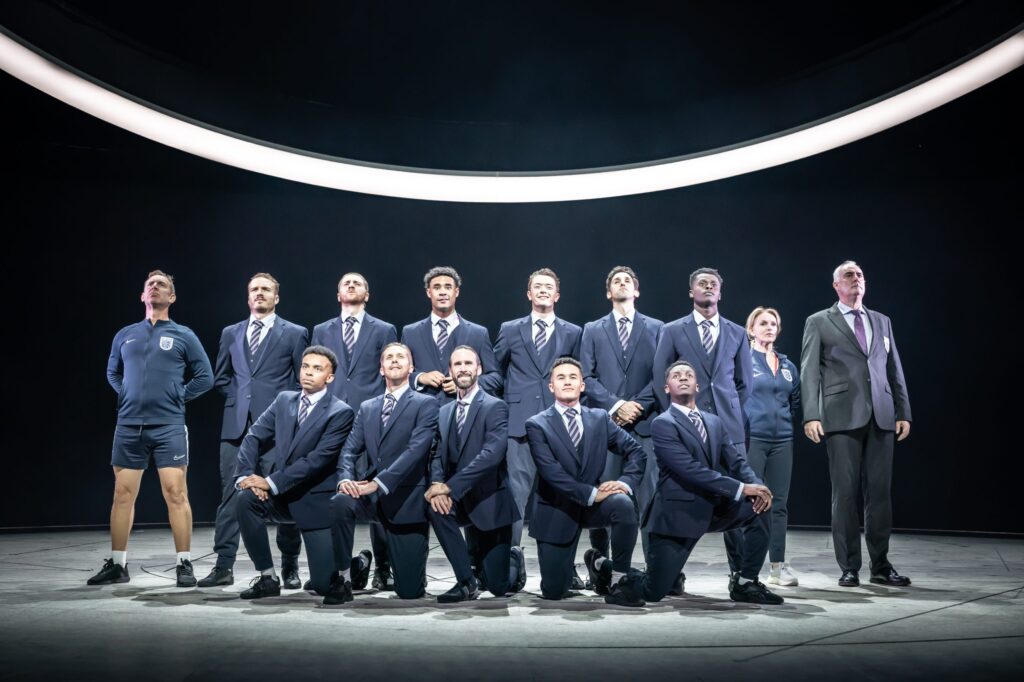Prince Edward Theatre – until 13th January 2024
Reviewed by Ben Jolly
4****
Entering the vast auditorium of the Prince Edward Theatre, we are greeted with a stark and formidable set; it is cold and menacing as though torn from the sound stages of a science-fiction movie, not something one would expect from a play chronicling England football manager Gareth Southgate and his journey with the team (where’s the turf?), yet still, entranced by the bright circle of penetrating light, we are drawn in and before we know it Dear England has kicked off into play.
James Graham’s latest labour of love hits the ground running with its high energy, witty characters, and engaging narrative. Opening with a historic but poignant moment that plagues Gareth Southgate’s psyche, we are given a glimpse into the deeply rooted demonic battle that he is having to face after all these years, and this is before he’s even begun to dissect the team or even the nation’s inner conflict. Seamlessly jumping to 2016, Southgate is offered a temporary management position to manage the England football team and it’s from here the plot commences.
We’re introduced to the ensemble of characters who make up the team and coaches – including Head of People and Team Development officer, Pippa Grange who is deliciously played on this outing by Dervla Kirwan winning the title, “woman of the match” for her performance. Kirwan embodies the behavioural characteristics without allowing the performance to lean into stereotype. Her performance is layered and crafted but is open to growth and impulse. The piece has been expertly cast with every detail and nuance clearly considered to the nth degree. There really is no weak link here. The entire ensemble work fluidly and consciously as a team to tell this story but there are still moments where each has the chance to shine with their vulnerable, raw emotional monologues and dangerously spot-on impersonations of media journalists and politicians alike. Without a doubt, our manager and principal cast member, Joseph Fiennes in the role of Gareth Southgate ultimately takes home the prize. Fiennes is commanding, sensitive and utterly charming in the role and he does so with an ease that can only come from a seasoned professional.
The play discusses the dramatical storytelling device of the three-act structure relating it to the England team’s six-year plan of victory. It is here that the playwright’s voice coming through the language is most prominent, and taking these dramatic forms and fusing them into a sports vernacular is a stroke of genius. In Act 2 we explore past the “road to success” and delve deeper into the psyche of the sport and pressures faced by the players both on and off the pitch. We investigate the racist attacks that players were targeted with following the loss of the Euro 2020 match. Packed with urgent subjects and intense confessions, this act was riddled with heightened emotion. These were unfortunately tied together and bandaged over with a little too much haste and thus prevented us from a satisfactory resolution. There was also a tendency for the play to meander with its narration and message as we were drawing to a close. It is, however, an impossible task to summarise a plot that is still an ongoing story today; I suppose trying to find some form of resolution in a world that continues to be in chaos would be a futile attempt.
It has become transparent both through this play and in other recent forms of media how well sport and drama go hand in hand. This piece can and should be appreciated by all, both sports and theatre fans combined as there is a pick-and-mix of what one can take away from this play, and smartly it ultimately leaves the audience to decide for themselves. My hope for this production is that it will be witnessed by both the usual theatre attendees and by avid football fans who for some may have never stepped into a theatre before. May this play become a timely wake-up call of the challenges we face as a society and in this unification remind us that we are not all that different after all.

